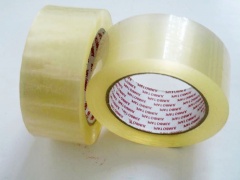Difference between revisions of "Adhesive Cellulose Tape"
m (→Shipment/storage) |
|||
| (9 intermediate revisions by 2 users not shown) | |||
| Line 1: | Line 1: | ||
| + | {{Infobox_Miscellaneous | ||
| + | | image = Adhesive_cellulose_tape.jpg | ||
| + | | origin = Various | ||
| + | | stowage factor = - | ||
| + | | humidity and moisture = - | ||
| + | | ventilation = - | ||
| + | | risk factors = Moisture and heating | ||
| + | }} | ||
==Description== | ==Description== | ||
| − | Is susceptible to heating. Rolls of tape so damaged may lose their entire adhesive properties. The adhesive substance on the sealing surfaces will be found to have dried out completely. On unwinding, the layer of dried-up gum comes off in the form of a dry flimsy film, and the resultant bare tape, in all probability, will be covered with opaque patches and blotches, and will commence to curl. The individual dispensers may be ‘bone dry’ and unblemished. Provided goods have not been shipped from old stock, such damage may have arisen from contact with heat due to bad stowage and/or improper ventilation during the voyage. | + | Sellotape is a British brand of transparent, cellulose-based, pressure sensitive adhesive tape, and is the leading brand in the United Kingdom. The term has become a genericised trademark in Britain, India, Serbia, Croatia, Greece and Macedonia, and is used much in the same way that scotch tape came to be used in the United States, in referring to any brand of clear adhesive tape.<br><br> |
| + | Sellotape Original is made using cellulose film derived from wood pulp. The cellulose film decomposes naturally in soil, and is naturally easy tear and non-static.<br><br> | ||
| + | ==Applications== | ||
| + | Sellotape is generally used for joining, sealing, attaching and mending.<br><br> | ||
| + | ==Shipment/storage== | ||
| + | Is susceptible to heating. Rolls of tape so damaged may lose their entire adhesive properties. The adhesive substance on the sealing surfaces will be found to have dried out completely. On unwinding, the layer of dried-up gum comes off in the form of a dry flimsy film, and the resultant bare tape, in all probability, will be covered with opaque patches and blotches, and will commence to curl. The individual dispensers may be ‘bone dry’ and unblemished.<br><br> | ||
| + | Provided goods have not been shipped from old stock, such damage may have arisen from contact with heat due to bad stowage and/or improper ventilation during the voyage.<br><br> | ||
| + | |||
| + | ==Risk factors== | ||
| + | Moisture and heating damage. | ||
| + | |||
[[Category:Products]] | [[Category:Products]] | ||
| + | [[Category:Miscellaneous]] | ||
Latest revision as of 12:17, 8 January 2021
| Infobox on Adhesive Cellulose Tape | |
|---|---|
| Example of Adhesive Cellulose Tape |  |
| Facts | |
| Origin | Various |
| Stowage factor (in m3/t) | - |
| Humidity / moisture | - |
| Ventilation | - |
| Risk factors | Moisture and heating |
Adhesive Cellulose Tape
Contents
Description
Sellotape is a British brand of transparent, cellulose-based, pressure sensitive adhesive tape, and is the leading brand in the United Kingdom. The term has become a genericised trademark in Britain, India, Serbia, Croatia, Greece and Macedonia, and is used much in the same way that scotch tape came to be used in the United States, in referring to any brand of clear adhesive tape.
Sellotape Original is made using cellulose film derived from wood pulp. The cellulose film decomposes naturally in soil, and is naturally easy tear and non-static.
Applications
Sellotape is generally used for joining, sealing, attaching and mending.
Shipment/storage
Is susceptible to heating. Rolls of tape so damaged may lose their entire adhesive properties. The adhesive substance on the sealing surfaces will be found to have dried out completely. On unwinding, the layer of dried-up gum comes off in the form of a dry flimsy film, and the resultant bare tape, in all probability, will be covered with opaque patches and blotches, and will commence to curl. The individual dispensers may be ‘bone dry’ and unblemished.
Provided goods have not been shipped from old stock, such damage may have arisen from contact with heat due to bad stowage and/or improper ventilation during the voyage.
Risk factors
Moisture and heating damage.











